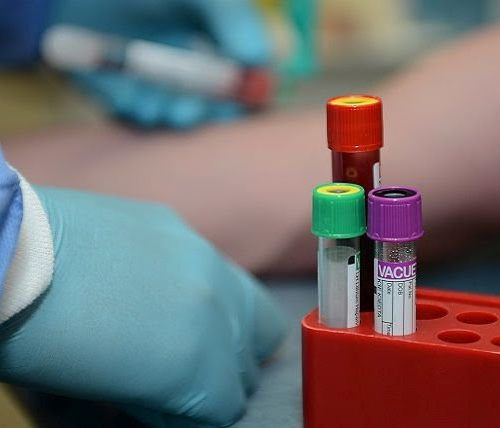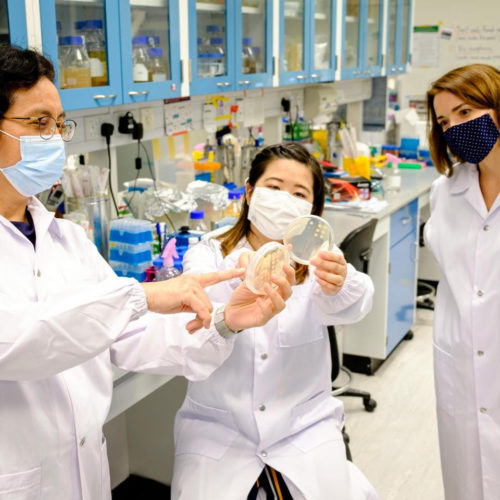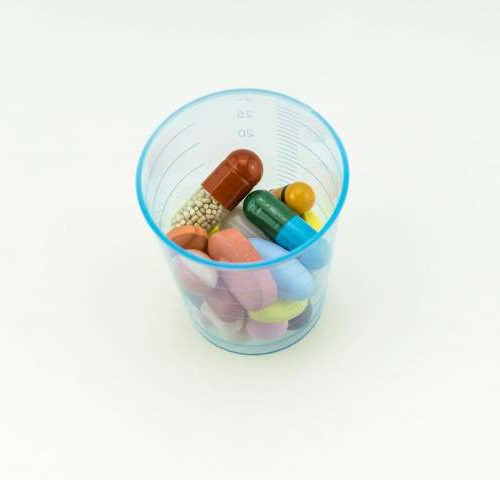Antibiotics use, particularly antibiotics with a greater spectrum of microbial coverage, may be associated with an increased risk of new-onset inflammatory bowel disease (IBD) and its subtypes ulcerative colitis and Crohn’s disease. That is according to a study by researchers at Karolinska Institutet in Sweden and Harvard Medical School in the U.S., published in the...
Tag: <span>antibiotics</span>
Designed bacteria produce coral-antibiotic
Sustainable biotechnological production of a natural substance against tuberculosis TECHNICAL UNIVERSITY OF MUNICH (TUM) HORN CORALS OF THE SPECIES ANTILLOGORGIA ELISABETHAE PRODUCE ANTIBIOTIC NATURAL SUBSTANCES. A RESEARCH TEAM AT TUM HAS SUCCESSFULLY PRODUCED ONE OF THESE SUBSTANCES IN THE LABORATORY. view more CREDIT: (IMAGE: THOMAS BRÜCK / TUM) Thomas Brück saw the sea whip Antillogorgia...
Targeting iron uptake to create a new class of antibiotics against UTIs
At 11 million cases annually, urinary tract infections (UTIs) are the most common outpatient infections in the U.S., according to the U.S. Department of Health and Human Services. At least half of all women will have a UTI during their lifetimes, and many of the infections — which have increasingly become resistant to a wide...
Test accurately IDs people whose gonorrhea can be cured with simple oral antibiotic
by University of California, Los Angeles A test designed by UCLA researchers can pinpoint which people with gonorrhea will respond successfully to the inexpensive oral antibiotic ciprofloxacin, which had previously been sidelined over concerns the bacterium that causes the infection was becoming resistant to it. In research published in the peer-reviewed journal Clinical Infectious Diseases,...
NTU develops peptide that makes drug-resistant bacteria sensitive to antibiotics again
Peptide also kills multidrug-resistant bacteria on its own NANYANG TECHNOLOGICAL UNIVERSITY SCIENTISTS AT NTU HAVE DEVELOPED A SYNTHETIC ANTIMICROBIAL PEPTIDE THAT MAKES DRUG-RESISTANT BACTERIA SENSITIVE TO ANTIBIOTICS AGAIN. ON ITS OWN, THE PEPTIDE CAN ALSO KILL BACTERIA THAT HAVE GROWN RESISTANT… view more CREDIT: NTU SINGAPORE Scientists at Nanyang Technological University, Singapore (NTU Singapore) have...
Antibiotics use early in life increases risk of inflammatory bowel disease later in life
Antibiotics use early in life increases risk of inflammatory bowel disease later in life MARTIN BLASER, DIRECTOR OF THE RUTGERS CENTER FOR ADVANCED BIOTECHNOLOGY AND MEDICINE view more CREDIT: RUTGERS UNIVERSITY Even short, single antibiotic courses given to young animals can predispose them to inflammatory bowel disease (IBD) when they are older, according to Rutgers...
Compounds show promise in search for tuberculosis antibiotics
by John Innes Centre Compounds tested for their potential as antibiotics have demonstrated promising activity against one of the deadliest infectious diseases—tuberculosis (TB). Researchers from the John Innes Centre evaluated two compounds with antibacterial properties, which had been produced by the company Redx Pharma as antibiotic candidates, particularly against TB. TB, which is caused by...
High levels of antibiotic-resistant bacteria found on equipment in communal gyms
Washington, DC – July 24, 2020 – Research presented at ASM Microbe Online found that 43% of Staphylococcus bacteria found on exercise equipment in university gyms were ampicillin-resistant, with 73% of those isolates being resistant to multiple additional drugs. The late Xin Fan, Ph.D., and her student Chase A. Weikel of West Chester University (WCU)...
Battle royale: How bacteria fight antibiotics and up the ante in chemical warfare
by Delthia Ricks , Medical Xpress Inadequate development of new antibiotics and rising rates of resistance by bacteria to existing antimicrobials are dual forces pushing the world ever closer to a post-antibiotic era. It has been an 80-year war, the battle pitched by bacteria against the chemical warfare designed to knock out infections—and on multiple...
Risk of sepsis greatest for patients with frailty, older age or urinary tract infections
Patients with frailty, older age and urinary tract infections (UTIs) are at greatest risk of developing sepsis following infection consultations in primary care, research has found. A research study published today in PLOS Medicine by researchers from King’s College London, with funding from National Institute for Health Research (NIHR), aimed to estimate the probability of...








